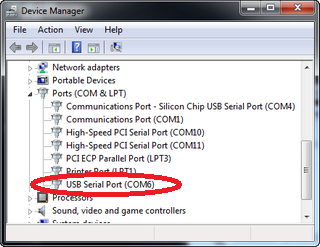
Mcp2200 Usb Serial Port Emulator Driver
• Functions • Embedded Software Integration • • • C Programming • • Articles • • • • • • • • • • • • • • • • • • • • • • MPASM™ Assembly Language Programming • • • • MPLAB® Harmony • • What is the MPLAB Harmony Framework? Notice: ARM and Cortex are the registered trademarks of ARM Limited in the EU and other countries.
Mcp usb serial port emulator windows 7 This page contains the driver installation download for mcp usb seriap port emulator in supported models pc specialist that are running a supportednbsp. Tyra Banks is the generate the puzzle. The USB is connected to the motherboard via a USB 2.0 port and the power supply is connected to a molex plug that. Did you install the hue+ driver inside CAM? Try deleting the MCP 2200 USB Serial Port Emulator.
Information contained on this site regarding device applications and the like is provided only for your convenience and may be superseded by updates. It is your responsibility to ensure that your application meets with your specifications. MICROCHIP MAKES NO REPRESENTATIONS OR WARRANTIES OF ANY KIND WHETHER EXPRESS OR IMPLIED, WRITTEN OR ORAL, STATUTORY OR OTHERWISE, RELATED TO THE INFORMATION, INCLUDING BUT NOT LIMITED TO ITS CONDITION, QUALITY, PERFORMANCE, MERCHANTABILITY OR FITNESS FOR PURPOSE. Microchip disclaims all liability arising from this information and its use. Use of Microchip devices in life support and/or safety applications is entirely at the buyer's risk, and the buyer agrees to defend, indemnify and hold harmless Microchip from any and all damages, claims, suits, or expenses resulting from such use. No licenses are conveyed, implicitly or otherwise, under any Microchip intellectual property rights.
I have tried everything I can imagine to get the MCP2200 working on Windows 7 machines, both 32 and 64bit, and have come to the conclusion that it is just not supported, regardless of Microchip's claims. I am unable to find any information on this subject that is not extremely technical, beyond my comprehension level. Here's the details on what I have done: I basically built the Gen 7 ExtensionBoard-USB-B 1.0(from the schematic) with an Arduino UNO. On a breadboard. I anticipated problems with USB as I have had many so far just trying to learn Arduino.
I am hesitant to commit to the full Gen 7 v1.5 board build if I cannot figure the basics out first(I am new to microcontrollers). I downloaded the Windows driver from Microchip onto one 64bit Win7 pc, and also two 32 bit Win7 machines. I thought it should work fine on the 32bit machines, but I read on the wiki about problems with some 64bit machines that were unsolved. I took a chance with the x64 anyhow. I then connected the circuit to a prototype Uno clone on a breadboard paying close attention to the Gen 7 v1.5 schematic's point to point wiring regarding the MCP2200. I doublechecked my connections many times. The first time I connected the circuit via USB was with the 64bit machine.
The pop-up immediately indicated to me that the new hardware was properly installed and designated a COM port. Then I opened up Arduino IDE and uploaded the blink sketch, went off without a hitch, establishing that pc to breadboarded communication was good. I then cycled the USB connection(disconnected then reconnected it). From this point on, I only get errors that the USB device was not installed properly, and there is no COM port shown in device manager.
So I moved the entire breadboarded circuit to a 32bit(Windows7)machine. Metti oli serial episode 800 number. From the get go, only errors with the USB device installation, no COM ports. Same situation on yet another 32bit(again Win7) machine. There was never one instance of good communication with any of the three PC's, after the initial connection to the 64bit pc. At this point I could assume that I damaged something, since this is still just a breadboarded circuit looking like spaghetti.except this: Next I installed the Microchip drivers on a WindowsXP machine.

Connected my breadboarded circuit and whah-la.connections are good once again. I swap out the ATmega chip with the blink sketch for one with a basic serial sketch on it, open the Arduino serial monitor, and establish that I do have good communication between the pc and breadboard.
So now I feel once again that my circuit is good. I remove the breadboard and again attempt connection with each of the Win7 pc's one by one.Nothing. I have tried everything from un/reinstalling the drivers, to swapping the rx/tx and data +/- lines, to trying suggestions posted by user Rezer on other threads in this forum, all to no avail.